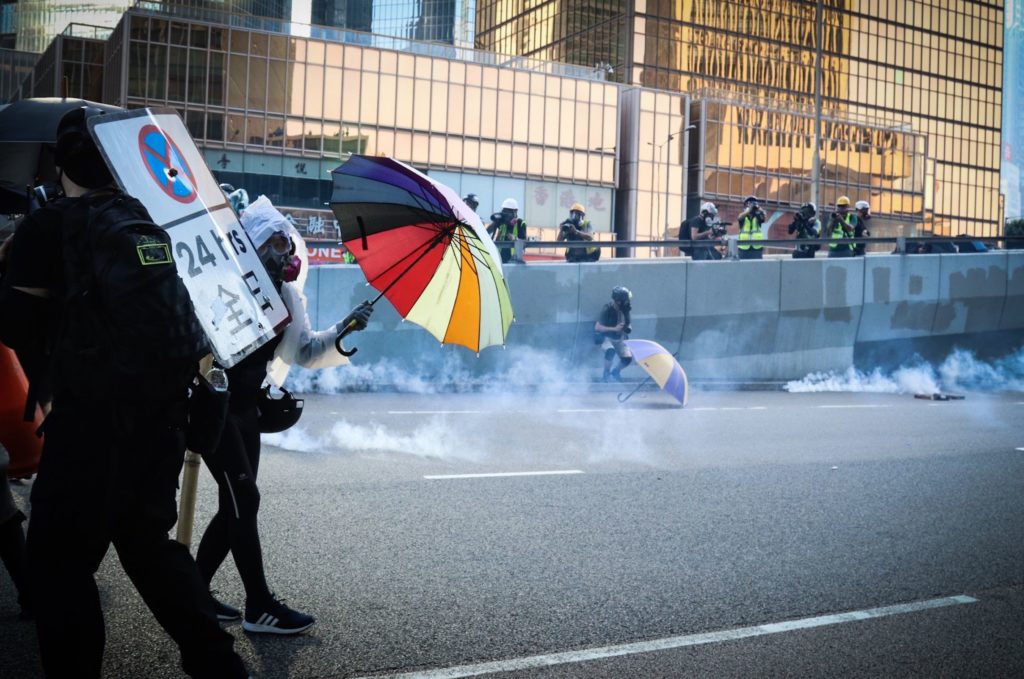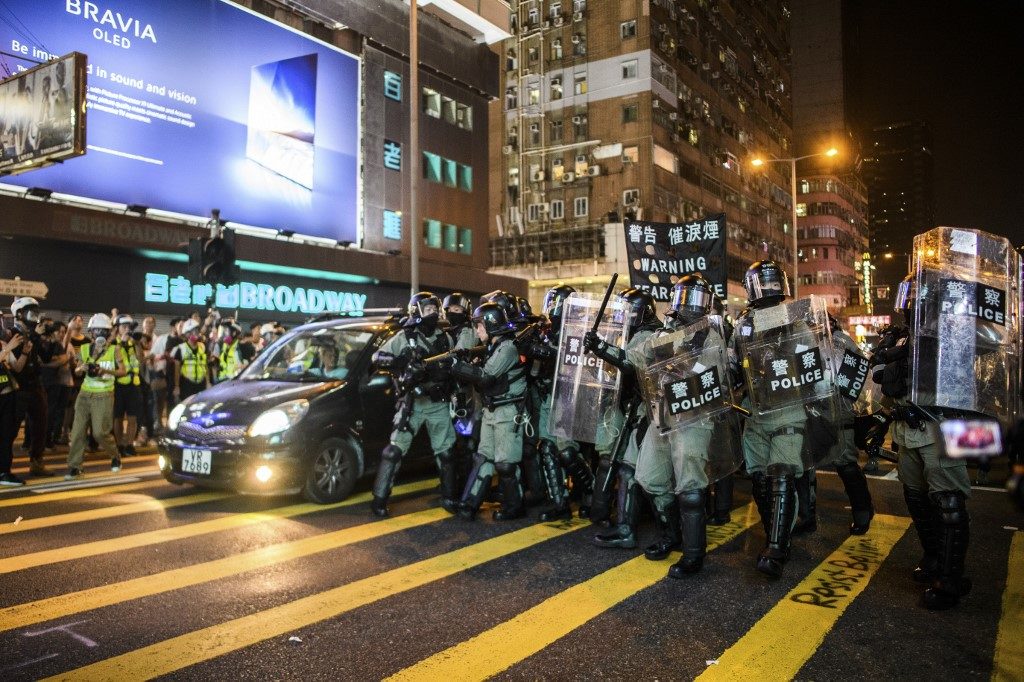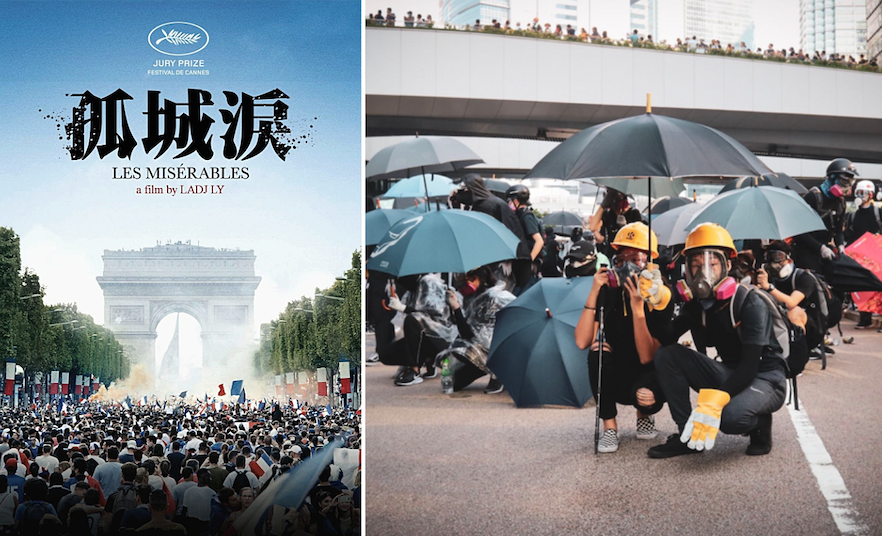This story contains spoilers.
Police violence, powers that go unchecked, a fight for fundamental rights—Hong Kong protesters are seeing reflections of their own movement in a French indie film, Les Misérables.
One of five Oscar-nominated pictures for 2020’s Best International Feature Film, Les Misérables shares little with Victor Hugo’s novel besides being set in the same Parisian suburb.
But just as protesters during the 2014 Umbrella Movement resonated with the revolutionary message behind “Do You Hear the People Sing,” the song from the musical adaptation of Hugo’s work, some are embracing Les Misérables as an understanding of what happens when a society’s ills are rooted in a system that won’t compromise.
Les Misérables debuted at the Cannes Film Festival last May before being released in France in November.
It hit Hong Kong screens on May 21, according to distributing company First Distributors. Encouraged by its popularity, over 30 cinemas were showing the movie by June 10, its ticket sales far surpassing that of other films in that period.
On popular protest forum LIHKG, at least half a dozen threads have been created to discuss the movie, with some calling it a “must-watch.”
At the Busan International Film Festival in South Korea last summer, the director of the film, Ladj Ly, said he supports the demonstrations in Hong Kong. In response, netizens thanked him for his encouragement and said they would watch the film when it is released.
“The reception of the film is undoubtedly due to the social movement, the experiences we have had for the last year that made it more relevant,” Sinnia Tam of First Distributors tells Coconuts HK.
Kids vs. cops
The film revolves around the racial tensions between the restive youth of Montfermeil, a low-income African immigrant neighborhood east of Paris, and a corrupt, majority-white police force.
When an officer fires a flash-ball gun at Issa, a boy who stole a lion cub from a traveling circus, during a violent confrontation, he knocks him unconscious and nearly takes his eye out. But the cops’ first instincts aren’t to bring him to a hospital—instead, their priority is to track down a drone that happened to capture the incident and erase all traces of their misconduct.
https://www.facebook.com/FDLHK/posts/3636265413054569?__xts__[0]=68.ARD684cJHa12SUmA3stxe_2T7KUgqwY90QAins3U16NnRIPszNcDlU4qB0dPovjLeadeUE75vxD3x8LxTOG2hxEnO86Jjsdbj8DxVPXk1YXtUiFYMN0Kg1NUpHjG0C-eJRZepd-5gwWVX_a6xV9Ncnz5shJ3G26oIzATfJsAvBvIq1Z9sK8v8zMeol8WnFhW5zOv813ZqszRrSAlGtVgurt_rAfARs2AIHPqMEg-XIoFNWyZge9appciz4W9QhaNwRCgYhodPYH0k2YbSwNoNKF6IJO37PA8z0HiLmtoAvDP80BENRvPzCDh0GYxspY3nAH1lWBLsiNmtjaF6SEIIa2PlbIGEyu8yXQO5WGQ3X9m9XPle_JeOWghHdabY1-bg2daqHhQWxhR0_PCGNgt5oVgKSr_YA_ncFvzdoqlHyMH5Wn9ScEE5FtW17Ya7HWTsz9PIWiFOzragO4k-yW8LhQVEqQKeAxWCoWxZir74-srJeVg2R2zFZEM&__tn__=-R
In an early scene, one of the officers frisks a teenage girl at a bus stop and makes explicitly sexual threats. When her friend takes out her phone to film the incident, he yells and smacks it down, breaking it.
It’s hard not to sympathize with the kids. Their suburb is a train ride from glitzy downtown Paris, but they may as well be half a world away. School’s out for the summer, so the children are whiling away their time playing in scrapyards and tobogganing down a trash-filled ditch. They see more of the racist, sexist cops who police their neighborhood than they do their parents, who don’t even seem to know their kids’ whereabouts.
Les Misérables reaches a harrowing climax when the cops find themselves ambushed by the kids in the graffiti-ridden stairwells of the suburb’s dilapidated public housing blocks. They light fireworks and throw Molotov cocktails at the police, the three officers outnumbered as they fight for their lives.
Familiar scenes
Hong Kong is nothing like inner-city Paris. It’s wealthier, more urban and relatively racially homogenous. But for those who actively support more radical means of protest, or have even been on the frontlines themselves, the scenes are reminiscent of their own battles.

In the film, the kids dress in black from head to toe and use metal road signs and furniture as makeshift shields. While the stairwell blitz is revenge for flash-balling Issa, neither he nor anybody else appears to be directing the attack. These elements are an inadvertent nod to Hong Kong’s leaderless movement, in which protesters in black bloc defend themselves with rudimentary armor.
“The root cause of Hong Kong’s protest and the riot in the movie is the governments that did not listen to their people, but instead kept suppressing them,” says Leo, a protester who had seen the film told Coconuts HK.
Even some of the film’s language is familiar to the Hong Kong audience. In the Cantonese subtitles, the boys are described as yong mo (勇武), the term meaning the “braves”—the hardline faction of Hong Kong protesters.
A superior at the police station reminds officers to stand in solidarity as a team, or tuen geet yut sum (團結一心). The idiom is a variation of tuen geet yut zee (團結一致)—a go-to, cliche phrase often used by Hong Kong officials to appeal to citizens to unite against protest violence.

And one of the police officers refers to the moment when he fired the flash-ball gun as deen gaung fo sek (電光火石), or “in a split second.” It’s the same phrase the city’s police used to justify an officer’s shooting of an unarmed protester last November.
Pushed to violence
Of course, watching Les Misérables through a hyper-focused Hong Kong lens would be ignorant of the racist and classist systems faced by black communities everywhere—something many Hongkongers acknowledge even as they draw comparisons with the city’s movement.
After all, the film draws on wider issues than the protest movement contends with, including class, discrimination, race and poverty.
Ben Lam, a Yau Tsim Mong district councillor who published an op-ed about the film, agrees that both Hong Kong protesters and the kids in Les Miserables are powerless in the face of police who aren’t held accountable for their actions.
But the kids in the film, he thinks, are in a much more dire and helpless situation.
“Hong Kong protesters hold press conferences and people will listen. They can get the empathy of international society and foreign politicians,” Lam says. “But in the film, the kids do not have anyone’s trust.”
Still, he thinks Les Misérables has resonated so strongly in Hong Kong because its message is a familiar protest ethos: “That when you use up all the peaceful means of protest, people will naturally choose violence as they have no other option.”




